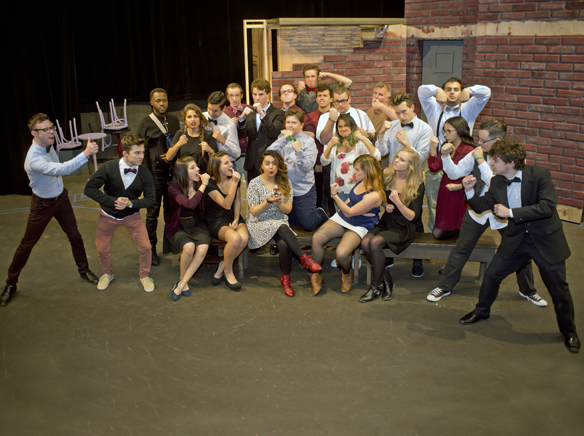Classic tales like “Romeo and Juliet” live endlessly throughout the centuries because of their overarching truth about human nature. The age-old story of two star-crossed lovers in impossible circumstances works because we can imagine it in any setting. This is precisely what the Theatre Arts Department of Grossmont College has done.
Classic tales like “Romeo and Juliet” live endlessly throughout the centuries because of their overarching truth about human nature. The age-old story of two star-crossed lovers in impossible circumstances works because we can imagine it in any setting. This is precisely what the Theatre Arts Department of Grossmont College has done.
With the setting of Prohibition-era Chicago, the story of Romeo and Juliet unfolds at first slowly, rather laboriously. The first scene opens on that city’s streets in 1937. The Montague and Capulet families are entangled in a Mafia drama reminiscent of the Boardwalk Empire. The organized crime feud among the relatives in the two families is the backdrop against which the young lovers find themselves.
Romeo and Juliet become almost magically entranced with each other, eager to rise above their families’ own troubled histories in crime. The Shakespearean prose seemed at first stilted in the actors’ dialogues, but as the story progressed, so did the ease with which the Capulets and Montagues unleash their fury and frustration with each other.
On the play’s opening night, Jillian Jones was magnificent as Juliet, alternating between outbursts of love, joy, and tragedy. Marco Rios, cast as Romeo, seemed to get his strength from Jones in her powerful delivery.
Several scenes were standouts. The dance party, set in the roaring 20s music of the time, with the ladies in flapper costumes and debonair men in suits and hats, was a joy to behold. Watching the partiers do the Charleston and other swing dance steps made it hard for audience members to sit still in their seats.
The fight scenes were admirable as the archenemies wielded knives against each other and delivered resounding bone-breaking blows. The emotional reaction and speeches by the Montague and Capulet families captured the rapt attention of the audience.
Jones and Rios delivered a powerful message in the tragic scenes of ending their lives, choosing to escape a life without each other rather than sell out to their families’ stubborn traditions rooted in rivalry. The actors would have made Shakespeare himself proud in their delivery of his literary masterpiece.
Theatre Department Chair Beth Duggan deserves recognition for an outstanding depiction of the fashion. Both the ladies and men’s costumes gave the audience a glimpse backward into the Roaring 20s.
Peg Marcus, a graduate of Grossmont College, said she enjoyed the play if only for the great review. “It’s been a long time since I read the play. I understood something about the story that I had not before.
“But I do wish I could have heard the actors better. When they turned away, it was hard to hear them because of the acoustics,” said Marcus, whose seat was on the top row.
Patsy Colorado and her sister Ginger had nothing but rave reviews for it. “We were on the very first row, front and center. We were enthralled. Every speech the actors made was perfect for what was going on.
“And the music, oh, the music was wonderful,” Colorado said.
The play raises questions challenging the audience to examine the power of passion and the matter of free will. Jeannette Thomas, director of the play, stated in the program, “Imagine what a different love story this play would be if Romeo’s and Juliet’s families embraced love instead of hate. Imagine if we stopped seeing each other as the opposition—no Capulet or Montague, no Republican or Democrat, no East Side or West Side.
“Imagine how much better the world would be if we all learned to, if to love, at least respect each other, to treat one another with dignity.”
“Romeo and Juliet” will run through Sunday, March 21. For a complete schedule of times and to purchase tickets online, go to www.grossmont.edu/theatrebrochure.














